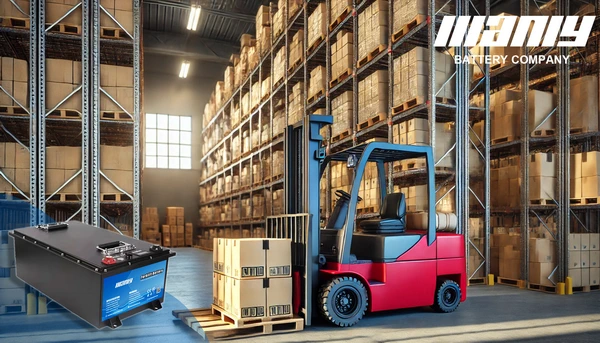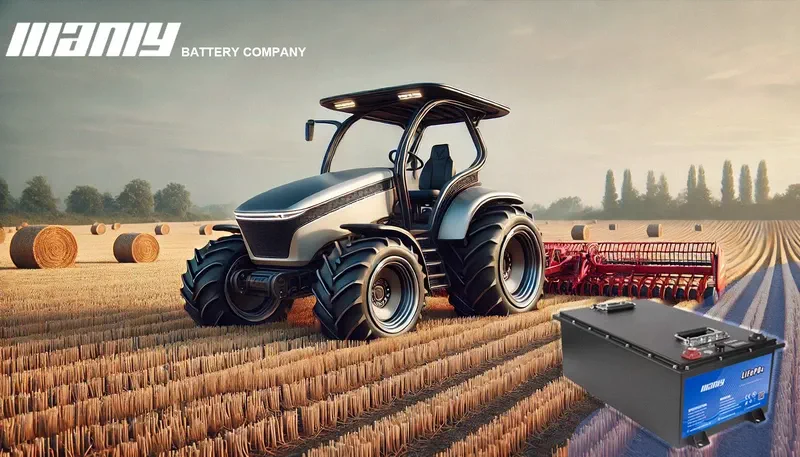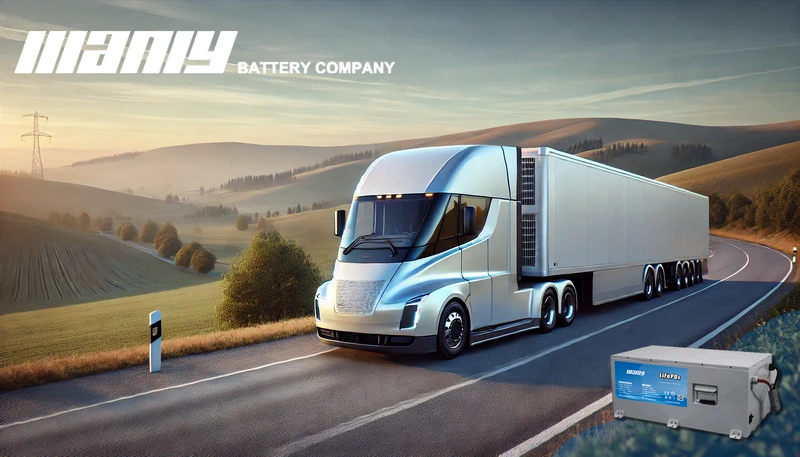What Are Industrial Batteries Used For?
Table of Contents
- What Are Industrial Batteries Used For?
- What Is an Industrial Battery?
- What Are 3 Common Types of Batteries?
- What’s the Difference Between a Regular Battery and an Industrial Battery?
- What Is an Example of an Industrial Battery?
- Where Are Industrial Batteries Used?
- Can You Use Industrial Batteries in Anything?
- Conclusion
- FAQ
- Hot Search
- Learn More About Battery
An industrial battery is more than just a power source; it is a cornerstone of modern industries. Designed for heavy-duty operations, these batteries ensure uninterrupted energy supply across a range of applications, including material handling, renewable energy storage, and critical infrastructure backup. With specialized features such as high energy density, extended lifespan, and minimal maintenance, industrial batteries support demanding environments, making them indispensable for efficient operations. This article explores the characteristics, applications, and advantages of these essential energy solutions.
What Is an Industrial Battery?
An industrial battery is a specialized energy storage device designed to provide reliable and long-lasting power for various demanding applications. These batteries are engineered to operate in challenging environments, offering consistent performance and durability across industries.
1. Definition and Key Characteristics of Industrial Batteries
Industrial batteries function by converting chemical energy into electrical energy through controlled electrochemical reactions. They are specifically built for heavy-duty use and are often customized to meet specific operational requirements.
Key characteristics include:
- Durability: Withstand harsh operating conditions, including high temperatures and heavy usage.
- High Energy Density: Capable of storing and delivering significant amounts of energy.
- Extended Lifespan: Designed to last longer than standard consumer batteries, minimizing replacement frequency.
2. Typical Applications and Industries They Serve
Industrial batteries power essential systems across various sectors, including:
- Material Handling Equipment: Forklifts, automated guided vehicles (AGVs), and pallet jacks in warehouses.
- Renewable Energy Systems: Solar and wind energy storage solutions for efficient power distribution.
- Critical Infrastructure Backup: Uninterruptible power supply (UPS) systems in hospitals, data centers, and emergency facilities.
- Construction Machinery: Excavators, loaders, and cranes requiring portable power solutions.
Related Entities
Industrial batteries play a crucial role in supporting renewable energy systems, material handling equipment, and critical infrastructure, emphasizing their importance in energy efficiency and reliability.
What Are 3 Common Types of Batteries?
The three most common types of batteries used in industrial applications are lead-acid batteries, lithium-ion batteries, and nickel-cadmium batteries. Each type serves unique needs and offers distinct advantages.
1. Lead-Acid Batteries
Lead-acid batteries are widely used due to their affordability and proven reliability.
- Features:
- Low upfront cost and easy accessibility.
- Simple maintenance requirements but shorter lifespan.
- Applications:
- Common in forklifts, backup power systems, and construction equipment.
- Drawbacks:
- Bulkier design and slower charging time compared to newer technologies.
2. Lithium-Ion Batteries
The lithium ion battery has gained immense popularity for its lightweight design and superior performance.
- Features:
- Fast charging capabilities and high energy efficiency.
- Longer lifespan and minimal maintenance.
- Applications:
- Ideal for renewable energy systems, high-capacity storage, and advanced material handling solutions.
- Advantages:
- Though more expensive initially, their long-term durability and performance make them cost-effective over time.
3. Nickel-Cadmium Batteries
Nickel-cadmium batteries are known for their reliability and performance in extreme conditions.
- Features:
- High energy density and resistance to temperature fluctuations.
- Applications:
- Used in aviation systems, emergency lighting, and other specialized equipment.
- Drawbacks:
- Higher costs and environmental concerns related to cadmium.
4. Comparison of Features and Use Cases
| Battery Type | Cost | Lifespan | Applications |
|---|---|---|---|
| Lead-Acid | Low | 3-5 years | Forklifts, Backup Systems, Construction Equipment |
| Lithium-Ion | High | 8-10 years | Renewable Energy Systems, High-Capacity Storage |
| Nickel-Cadmium | Moderate to High | 5-7 years | Aviation, Emergency Lighting |
By understanding these types, industries can choose the most suitable industrial battery to ensure efficiency and reliability for their specific needs.
What’s the Difference Between a Regular Battery and an Industrial Battery?
The primary differences between a regular battery and an industrial battery lie in their durability, capacity, and lifecycle. Industrial batteries are designed to endure harsher conditions and provide consistent power for demanding applications, whereas regular batteries are intended for light-duty, everyday use.
1. Comparison of Performance
- Durability:
- Industrial Battery: Built to withstand extreme temperatures, vibrations, and physical impacts without compromising performance.
- Regular Battery: Not designed for rugged conditions; typically used in controlled environments.
- Capacity:
- Industrial Battery: Features higher energy storage capabilities, ensuring long-lasting power for heavy-duty equipment.
- Regular Battery: Provides limited capacity, suitable for low-power devices like remote controls or flashlights.
- Lifecycle:
- Industrial Battery: Offers a significantly longer lifespan, often lasting years with proper maintenance.
- Regular Battery: Shorter lifecycle, requiring frequent replacement.
2. Example Scenarios
Industrial batteries excel in environments where reliability and performance are critical. For instance:
- Manufacturing: Operating heavy machinery under continuous use.
- Warehousing: Powering material handling equipment such as forklifts.
- Energy Storage Systems: Storing renewable energy for uninterrupted power supply.
In contrast, regular batteries are ideal for consumer electronics that demand lower power and occasional use.
3. Stress Conditions and Applications
Industrial batteries are designed for high-stress applications, including extreme heat or cold, prolonged use, and high energy demands. They are the backbone of industries relying on uninterrupted power for mission-critical operations.
What Is an Example of an Industrial Battery?
One of the most notable examples of an industrial battery is a lithium ion battery used in material handling equipment like warehouse forklifts. These batteries showcase superior performance and are a popular choice across industries.
1. Features and Benefits
- High Energy Density: Lithium ion batteries can store and deliver significant power in a compact form.
- Fast Charging: Their ability to recharge quickly minimizes downtime in industrial operations.
- Long Lifespan: These batteries last longer than traditional lead-acid batteries, reducing replacement costs over time.
- Low Maintenance: Unlike lead-acid alternatives, lithium ion batteries require minimal upkeep, saving time and effort.
2. Cost Efficiency and Environmental Impact
While lithium ion batteries have a higher upfront cost, their extended lifespan and lower maintenance requirements make them a cost-effective solution. Additionally, their higher energy efficiency and recyclable components contribute to a reduced environmental footprint.
3. Case Study: Material Handling Operations
In a warehouse setting, lithium ion batteries power forklifts with exceptional reliability. Their fast charging and ability to handle heavy loads improve operational efficiency, enabling businesses to meet tight deadlines while lowering energy costs.
Where Are Industrial Batteries Used?
Industrial batteries are indispensable across various industries where durable, reliable, and high-capacity energy storage is essential. Their versatility and robust design make them a preferred choice for applications requiring consistent power under demanding conditions.
1. Industries Relying on Industrial Batteries
- Warehousing and Logistics
- Applications: Industrial batteries power forklifts, automated guided vehicles (AGVs), and other material handling equipment.
- Key Benefits: Their ability to provide sustained energy ensures uninterrupted operations in warehouses and distribution centers, enhancing productivity.
- Renewable Energy Storage
- Applications: Supporting solar farms and wind energy systems by storing and distributing energy efficiently.
- Key Benefits: Lithium ion batteries are especially valuable in this sector due to their high energy density and rapid charge-discharge cycles, crucial for optimizing renewable energy usage.
- Telecommunications and Data Centers
- Applications: Used in uninterruptible power supplies (UPS) to protect critical infrastructure such as hospitals, data centers, and telecom networks from power outages.
- Key Benefits: Industrial batteries ensure consistent power delivery, safeguarding sensitive systems and preventing data loss.
- Construction and Heavy Equipment
- Applications: Powering equipment like cranes, loaders, and excavators.
- Key Benefits: Industrial batteries provide the rugged performance required in harsh construction environments, reducing reliance on fossil fuels.
- Emerging Trends
- The adoption of industrial batteries in smart grid energy systems and advanced robotics continues to grow. These applications demand efficient, long-lasting batteries that can handle frequent charge-discharge cycles and variable power requirements.
Can You Use Industrial Batteries in Anything?
Industrial batteries are not universally compatible with all devices. They are engineered for specific applications that require higher energy output, enhanced durability, and the ability to function in extreme conditions.
1. Limitations and Compatibility
- Specialized Design: Industrial batteries are often tailored to meet the unique power needs of heavy machinery, energy systems, or critical infrastructure.
- Size and Weight: Their larger size and weight compared to consumer batteries can make them unsuitable for small or portable devices.
- Voltage Requirements: The high voltage output of an industrial battery may exceed the capacity of consumer electronics, posing a risk of damage or safety concerns.
2. Risks of Using Industrial Batteries in Consumer Electronics
- Overpowering: The high energy capacity can cause overheating or even damage devices not designed to handle industrial-grade batteries.
- Reduced Efficiency: Industrial batteries are optimized for sustained, heavy-duty use, making them less efficient in low-demand applications.
3. Guidelines for Selecting the Right Battery
To ensure optimal performance and safety:
- Assess Power Requirements: Match the battery’s output capacity with the device’s energy needs.
- Environment Compatibility: Choose batteries designed for the operating conditions, such as high temperatures or vibrations.
- Battery Chemistry: Select the appropriate type, like a lithium ion battery for high energy efficiency or a lead-acid battery for cost-effective bulk storage.
By understanding these factors, users can ensure they choose the right industrial battery for their specific application, avoiding risks and maximizing performance.
Conclusion
Industrial batteries play a vital role in powering industries that rely on consistent and reliable energy. From lithium ion battery solutions for high-capacity storage to rugged lead-acid batteries in construction equipment, these power sources meet diverse needs with unmatched performance. Their durability, efficiency, and adaptability ensure that businesses can maintain operations even in the harshest conditions. As industries evolve, industrial batteries remain a key player in driving innovation and sustainability in energy solutions.
FAQ
1. How do industrial batteries work?
Industrial batteries work by converting chemical energy into electrical energy through controlled electrochemical reactions. These reactions occur within the battery’s cells, where materials like lead-acid or lithium-ion compounds release electrons to generate power. Designed for heavy-duty applications, industrial batteries provide consistent energy output and are built to endure extreme conditions.
2. What is the voltage of an industrial battery?
The voltage of an industrial battery varies depending on its type and application. Common industrial battery voltages include 12V, 24V, 36V, and 48V for equipment like forklifts and backup systems. Some specialized batteries, such as those for renewable energy storage, can exceed 100V to meet high-capacity demands.








